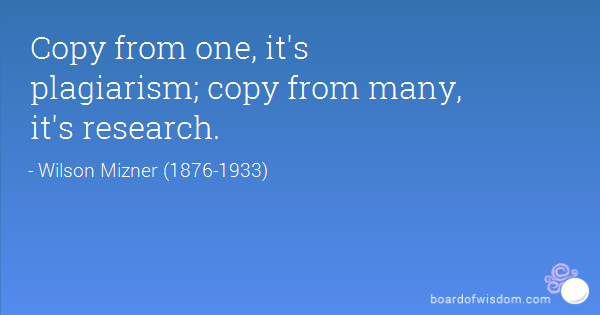The 3rd chapter of the MOOC is about how innovations come about. Lots of factors influence on the process of innovation and one of those, of course, are the influences. Every time that we create something, we use our own experiences but also the influences that other people’s work exerted in us. But where’s the barrier between being influenced by someone and copying? As an example, in last week’s column I cited Descartes’s work, which is obviously an influence, but what would have happened if I didn’t mentioned that Descartes was the owner of those words? Then I would be cheating? On one hand, some people would consider that I was cheating because those ideas were not mine and, on the other hand, some other would consider that telling something which I don’t invented is not cheating if I don’t pretend to be the owner of those words. As we can see, the terrain is slippery.
Let’s go one step further. Sometimes, in science, researchers discover things that are useless despite true and, some years later, someone else takes profit of that knowledge and creates something applying it. Considering that the other person had no allowance from the researcher to use his discovery and had “inspired” himself in the researcher’s work, there are 3 possible approaches to the situation (R=Researcher, S=Engineer):
- R had a brilliant idea which S stole to be the cornerstone of his new invention. All the merit is for R.
- R’s discovery was something useless and S had a great idea to take profit of it. All the merit is for S.
- R discovered something with a great potential and S applied something that he would have never discovered alone.
A general opinion could be that these considerations could be simplified with a patent done by the researcher. The problem is that, according to the actual U.S. law, any person who "invents or discovers any new and useful process, machine, manufacture, or composition of matter, or any new and useful improvement thereof, may obtain a patent.", which means that the researcher has no chance to protect his discovery. In that situation, we should face a strong ethical debate.
That example was useful to see that who is the author of something may not be clear, but we’ll keep with the column idea, let’s see that this copy/association can be good for humanity. Imagine that the researcher had discovered a strange behaviour in a concrete bacteria and the other person had created a vaccine against that bacteria, then the result would be completely positive for humanity, despite the unfair act of copying and independently of who is the author.
As a second argument in favour of copying let’s consider a last situation. In the hardest mathematics disciplines, sometimes the new theories and discoveries developed by young mathematicians cannot be understood for everyone and are impossible to prove. Because of that, lots of right mathematic theories have needed some decades to be accepted by the scientific community because, as they could not understand it, the members of the committee disapproved the theory. Nevertheless, what would have happened if a renowned mathematician had proposed the new theory? Probably the committee would have accepted it because of the trust that the renowned mathematician had gained during his whole career.
As a conclusion, despite we have been taught since we were young that copying is something reprehensible, we can point that copying can be good for the whole society as a way to improve and find an utility to someone’s work, and as a way to prestige an invention. Even considering that the original author is highly damaged because otherwise, his work would have never been applied.
